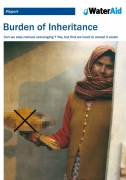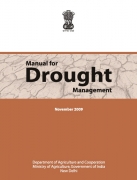Governance
Water Policy in India - A brief overview: A paper by Centre for Public Policy (IIM Bangalore)
Posted on 20 Apr, 2010 06:30 AMThis paper by the Centre for Public Policy (CPP) of the Indian Institute of Management (IIM) Bangalore adds to the debate on water policy in India, and provides a general overview of the main characteristics of irrigation development post-Independence and a review of its beneficial and adverse impacts. The problems that need to be addressed and measures needed to resolve them are highlighted. It recognizes the vital role of expansion of irrigation in transforming agriculture from one of near stagnation in the pre-independence period to one of sustained growth during the past five decades.
Rainwater harvesting in Mumbai: Application of GIS
Posted on 19 Apr, 2010 07:36 PMThis blog post by Prakash Apte, draws attention to the increasing water demand in urban areas because of industrialisation and population growth by giving the example of Mumbai and points at the current scenario of the lack of availability of adequate and safe water supply to meet the needs of the ever increasing population in the city.
The author proposes that rainwater harvesting can be a viable solution in cities such as Mumbai to meet this increasing demand for water and can provide an opportunity for equitable, efficient and sustainable use of water resources.
There is an urgent need for evolving a rainwater harvesting system that is sustainable, replicable and economically viable and argues that the benefits of using rainwater harvesting can lead to a range of social, economic and environmental benefits and can contribute substantially to improving the quality of life in Mumbai.
Geographic Information Systems (GIS) has a role and application, in promoting a system and methodology for rain water harvesting and for providing the data needed to enable its large scale implementation in the context of Mumbai.
Burden of Inheritance: Can we stop manual scavenging? – A report by WaterAid India
Posted on 19 Apr, 2010 04:28 PM This report by WaterAid outlines how over one million people in the country continue to scrape an existence through manual scavenging, forced largely by social convention and caste prejudice, and calls for strong action to eradicate this practice.
This report by WaterAid outlines how over one million people in the country continue to scrape an existence through manual scavenging, forced largely by social convention and caste prejudice, and calls for strong action to eradicate this practice.
A violation of human rights, this discriminatory and demeaning practice was outlawed by the Indian Parliament in 1993 but still continues today. India has missed three deadlines to make the country 'manual-scavenger free'. India's booming cities help keep the practice alive, as there is often little infrastructure for sanitary sewerage and waste disposal systems.
The report tries to seek answers to why this practice continues despite:
- Availability of other dignified livelihood sources, for the people in this occupation?
- Other cleaner options for survival existing in cities and towns?
- Feasible and viable technological alternatives being available to dry toilets, one of the drivers of this occupation?
Manual on drought management by the National Institute Disaster Management and the Ministry of Agriculture (2009)
Posted on 15 Apr, 2010 04:13 PM This manual developed by the National Institute of Disaster Management (NIDM) presents a comprehensive approach to drought management and recommends measures that can be implemented for effective drought relief and mitigation. It brings together conceptual issues, institutional framework & operational details, and replaces the colonial famine codes written largely for dealing with hunger and starvation.
This manual developed by the National Institute of Disaster Management (NIDM) presents a comprehensive approach to drought management and recommends measures that can be implemented for effective drought relief and mitigation. It brings together conceptual issues, institutional framework & operational details, and replaces the colonial famine codes written largely for dealing with hunger and starvation.
It has been prepared with the objective of creating synergy between the various programmes being implemented to provide drought relief and mitigation by several levels of government.
The key issues covered in the manual are:
State-level utilization of funds and assets created through Ganga Action Plan - Report by Planning Commission for the Supreme Court (2009)
Posted on 15 Apr, 2010 03:41 PMThe report was prepared by the Water Resources Division, Planning Commission in response to a Supreme Court directive to verify whether the funds allocated to Ganga Action Plan (GAP) had been duly utilized by the States. The report is based on data obtained from Central Pollution Control Board (CPCB) and Ministry of Environment and Forests (MoEF) and field visits made to plant sites in Uttarakhand, Bihar and Uttar Pradesh.
Solar water heaters in India: Market assessment studies and surveys for different sectors and demand segments by Greentech Knowledge Solutions
Posted on 15 Apr, 2010 11:12 AM The report endeavors to study the Solar Water Heater (SWH) market in India and project a realizable demand till 2022. It looks at the industry structure, supply conditions and value proposition. It relies heavily on interactions with a wide range of stakeholders, such as SWH users, potential SWH users, state level renewable energy development agencies, architects and builders, banks, municipal corporations, electricity distribution companies and pollution control boards.
The report endeavors to study the Solar Water Heater (SWH) market in India and project a realizable demand till 2022. It looks at the industry structure, supply conditions and value proposition. It relies heavily on interactions with a wide range of stakeholders, such as SWH users, potential SWH users, state level renewable energy development agencies, architects and builders, banks, municipal corporations, electricity distribution companies and pollution control boards.
Making climate look like trade? - Questions on incentives, flexibility and credibility - A policy brief by Centre for Policy Research
Posted on 14 Apr, 2010 06:48 PMThe policy brief published by the Centre for Policy Research (CPR), India addresses the debates around climate change that took place before and after the Copenhagen Climate Conference (2009) that raised a number of questions regarding the architecture of the global climate regime.
Climate change threats to India's water resources and emerging policy responses - From the book 'Indian climate policy: Choices and challenges', by the Henry Stimson Centre.
Posted on 14 Apr, 2010 11:01 AMThis book published by Henry L. Stimson Centre highlights the richly diverse nature of India's views on climate change through its range of essays. These essays demonstrate and challenge the international perception of India as a monolithic actor with a single set of opinions and views in the climate change negotiations.
In this chapter, the author discusses the strengths and the weaknesses of India's climate policy in the context of the increasing threats that have been identified to the water resources in the country. The author states that India's climate policy is still in its emerging state and argues that though the policy does highlight many important areas related to climate change, it does not give adequate attention to a very crucial area of water management.
Open Source GIS Training Program - IIT Madras, Chennai
Posted on 13 Apr, 2010 09:31 PMProgram Name : Open Source GIS - Quantum GIS – 5 Day Training Program
Organiser: IIT Madras in collaboration with kCube,
IIT Madras in collaboration with kCube, Chennai is organizing a five day Training Program on Open Source GIS – Quantum GIS.
Making NREGA work better: A brief note by Public Interest Foundation
Posted on 13 Apr, 2010 01:16 PMThis note by the Public Interest Foundation (PIF) presents a proposal for making National Rural Employment Guarantee Act (NREGA) work better. It offers an alternative to the existing rigid framework for implementation and complex procedures leading to bureaucratization of the implementation process thereby causing uncalled-for delays. The note is a follow-up of its collaborative study with National Council for Applied Economic Research (NCAER) on “Evaluating Performance of NREGA” as well as the Comptroller and Auditor General's (CAG) performance report on implementation of NREGA.





